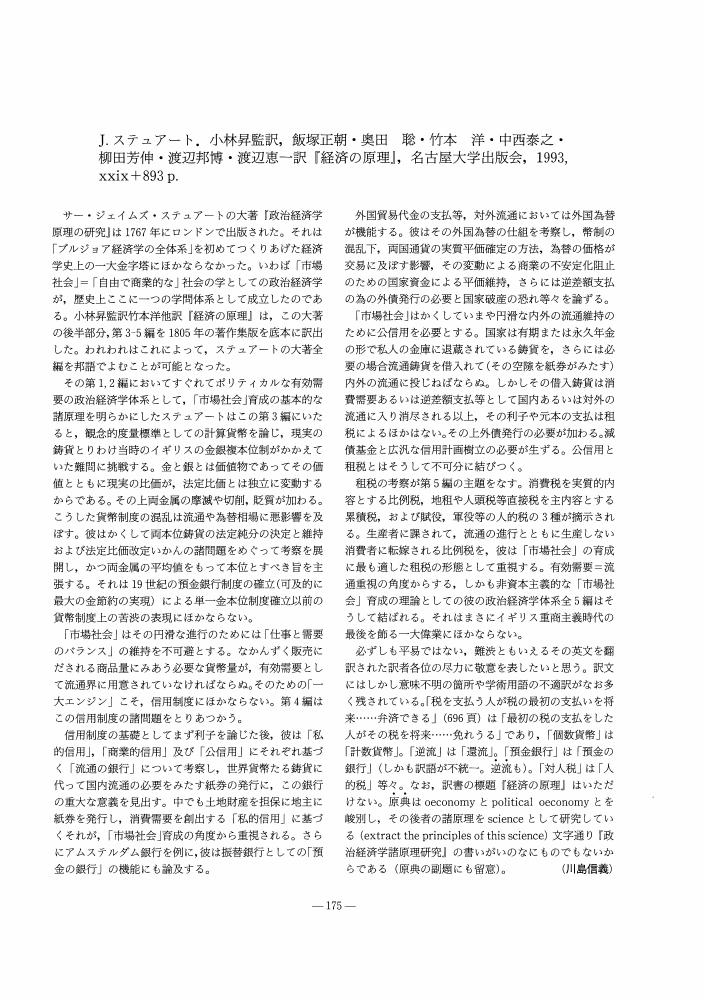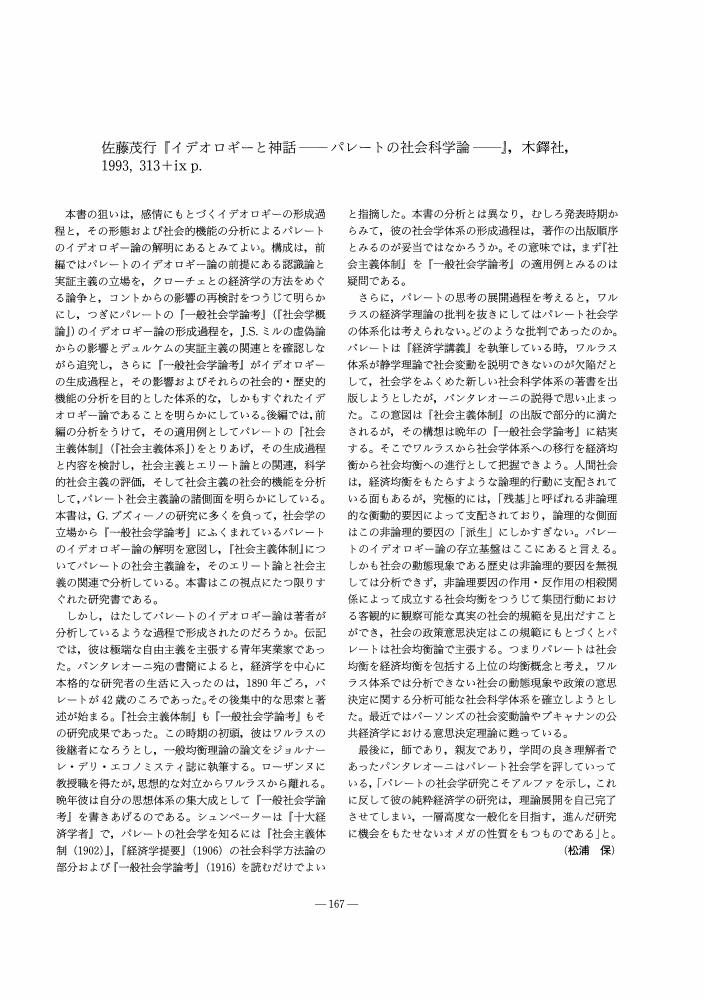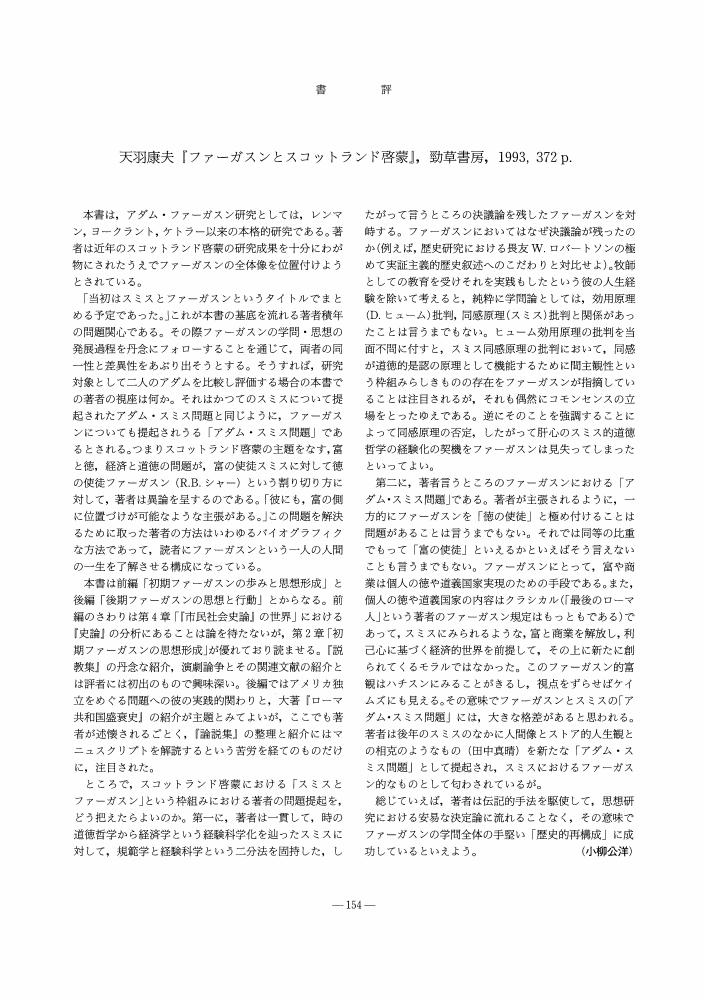1 0 0 0 OA アダム・スミス: 穏健派とケイムズとシヴィック・ヒューマニズム
- 著者
- 有江 大介
- 出版者
- The Japanese Society for the History of Economic Thought
- 雑誌
- 経済学史学会年報 (ISSN:04534786)
- 巻号頁・発行日
- vol.33, no.33, pp.1-12, 1995 (Released:2010-08-05)
- 参考文献数
- 47
This paper will examine several aspects of the intellectual atmosphere in the middle of eighteenth-century Scotland, where Smith had developed his idea of a new social science.I first introduce mainly through Blair's sermons, that the Moderates' view of providence-based functional society was static and conservative, and lacked the concept of progress or stage theory of society, though they were more enlightened than Presbyterian orthodoxies.Second, I show empirically the psychological expansion of the idea of moral sense by Kames, who introduced feeling as a basic factor for moral judgment. This implies an intellectual tendency that would rather insist human autonomy as a moral agent than claim a priori conscience with an abstract character like benevolence.The intellectual atmosphere above suggests a basic divergence of the Moderates' thought from Smith's framework which was to be shown in Theory of Moral Sentiments or Wealth of Nations. This suggestion would give us an effective device which can rescue Smith from an intricate trap of the so-called civic humanist paradigm that has confined Smith, by applying Q. Skinner's radical relativism, to be just one of eighteenth-century moralists rather than a founder of a new science.
1 0 0 0 OA リカードウ: アーチボルド・アリソンの保護主義
- 著者
- 服部 正治
- 出版者
- The Japanese Society for the History of Economic Thought
- 雑誌
- 経済学史学会年報 (ISSN:04534786)
- 巻号頁・発行日
- vol.33, no.33, pp.13-25, 1995 (Released:2010-08-05)
In this paper I consider some aspects of Archibald Alison's protectionism. Alison (1792-1867) was considered “the most unbending Conservative in Great Britain” during the first half of the 19th century.Alison criticized Malthus's principles of population. Even in an old society such as Britain, population was far from pressing subsistence. But Sir Robert Peel's Bank Acts of 1819 and 1844 had decreased the demand for labour by a reduction of paper currency. The repeal of the Corn Laws increased the quantity of imported corn enormously, and resulted in the distressed state of British agricuture. The Free Trade System compelled Britain to follow in the path of the fall of the Roman Empire.Alison adovocated a moderate degree of Protection to Native Industry, and a systematic emigration. He believed that Britain could develop its colonial empire by these measures. Alison's Protectionism consisted of agricultural protection and systematic emigration, and the latter led to protection on all goods, rude or manufactured.
1 0 0 0 OA マーシャル: 歴史学派の時代からの照射
- 著者
- 西沢 保
- 出版者
- The Japanese Society for the History of Economic Thought
- 雑誌
- 経済学史学会年報 (ISSN:04534786)
- 巻号頁・発行日
- vol.33, no.33, pp.26-38, 1995 (Released:2010-08-05)
- 参考文献数
- 32
English classical economics enjoyed supreme authority during England's reign as ‘the workshop of the world’, which generated Anglo-centric chauvinism and insularity. Against this background emerged a ‘new cohort of economists’ —Leslie, Bagehot, Jevons— who all rejected ‘the Ricardo-Mill Economics.’ Marshall was almost as critical as had been the historical critics, and he did much to further ‘the loss of insularity.’ He highly regarded the German Historical School, in particular, Friedrich List. Marshall was as concerned about the decline of English industrial leadership as were Ashley and Chamberlain. However, he wrote that ‘the simplicity and naturalness of Free Trade’ remained ‘the best’, and diametrically opposed to the minority report on the Depression of Trade and Industry.
1 0 0 0 OA ウイーン体制期フランス産業思想の一断面
- 著者
- 東 基樹
- 出版者
- The Japanese Society for the History of Economic Thought
- 雑誌
- 経済学史学会年報 (ISSN:04534786)
- 巻号頁・発行日
- vol.33, no.33, pp.52-64, 1995 (Released:2010-08-05)
The character of social organization in the European countries caused violent revolution within them (especially France) and wars between them which gave rise to a sense of crisis and stimulated Saint-Simon to reflect upon the possibility of a new social organization able to overcome the crisis. Central to his solution were a principle and strategy to give the society a unity and a universality and to give the member of the society a basis to realize morality concretely.Saint-Simon developed wisdom based upon scientific knowledge as the principle of the new social organization and at first he insisted upon a morality based upon knowledge and rule proportional to knowledge. He did not attach much importance to subjective morality or to the liberty of individuals. But as Saint-Simon acquired critical understanding of the Vienna Regime and more especially about British society, he began to attach importance to subjective morality and individual liberty. This is because he understood that it is a condition for knowledge to function as a principle of society that individuals in the society recognize and respect each other subjectively and freely as owners of knowledge motivated by philanthropy.
1 0 0 0 OA J. S. ミル相互需要説をめぐる諸問題
- 著者
- 藤本 正富
- 出版者
- The Japanese Society for the History of Economic Thought
- 雑誌
- 経済学史学会年報 (ISSN:04534786)
- 巻号頁・発行日
- vol.33, no.33, pp.65-78, 1995 (Released:2010-08-05)
Though J. S. Mill's theory of reciprocal demand was developed in the chapter “Of International Values” in the first edition of his Principles of Political Economy (1848), Mill added new sections in the third edition (1852). In Mill's mind, the theory of reciprocal demand had not been complete, because the conditions of the Equation of Demand “might be equally satisfied by every numerical rate”. To determine a unique equilibrium, Mill introduced a new element, “the means of production available.”In this paper, it is claimed that Mill's discussion in the new sections was influenced by William Thornton's criticism of the law of supply and demand, and by William Whewell's mathematical analysis.Thornton's influence on Mill shows itself in Mill's recognitions of the multiple equilibria related to the price elasticity of demand. On the contrary, Whewell's influence stems from his treatment of theoretical subjects related to Mill's new approach to the theory of reciprocal demand. In particular, the amount of the inported-goods consumed in each country before trade, into which Mill translated the means of production available, is a variable in Whewell's mathematical model.
1 0 0 0 OA ケインズ『貨幣論』と利子理論
- 著者
- 加納 正雄
- 出版者
- The Japanese Society for the History of Economic Thought
- 雑誌
- 経済学史学会年報 (ISSN:04534786)
- 巻号頁・発行日
- vol.33, no.33, pp.90-100, 1995 (Released:2010-08-05)
- 参考文献数
- 15
Keynes' argument that income can change without any change in the quantity of money appears in his Treatise on Money. This argument is essentially concerned with the theory of interest and the equilibrium condition in the money market, but Keynes' argument in the Treatise concerning these matters has not been sufficiently analyzed. The purpose of this paper is to clarify these matters and investigate the significance of the argument in the Treatise.In the Treatise, the total demand function for money is not specified and the money market is not theoretically related to the goods market. Then the theory of interest in the Treatise is not complete, but it can be regarded as a theory which necessarily developed into the liquidity preference theory of interest in the sense that the interest rate is governed by the excess demand for money. Furthermore, the Treatise contains valuable analysis of many subjects which are not covered in the General Theory, such as the transaction demand for money in disequilibrium and the behavior of banks.
1 0 0 0 OA ハイエクと進化
- 著者
- 江頭 進
- 出版者
- The Japanese Society for the History of Economic Thought
- 雑誌
- 経済学史学会年報 (ISSN:04534786)
- 巻号頁・発行日
- vol.33, no.33, pp.101-112, 1995 (Released:2010-08-05)
- 参考文献数
- 19
This paper deals with F. A. Hayek's theory of evolution. It is well known that F. A. Hayek's spontaneous order theory is based on the theory of evolution, but there are few works which focus on Hayek's evolutionary concept itself. However, this concept is important for understanding Hayek's social and economic philosophy. In this paper, the concept is clarified through comparison with the theories of H. Spencer, A. Marshall and T. Veblen. The keyfeatures of Hayek's theory are that; (1) he did not use a biological analogy; (2) he thought that social evolution should be described as the development of order. Unlike Marshall, Hayek thought that a biological analogy distorted the character of social phenomenon so that the theory of social evoloution had to be unique.In the first section of this paper, an outline of theories of Spencer, Marshall and Veblen is presented, which emphasizes how they differ in how they apply various aspects of the theory of evolution to social sciences. The second section explains Hayek's theory of evolution. In the third section the relation between the theory of evolution and the spontaneous order theory is highlighted. In the last section, the central problem raised up by Hayek is considered.
- 著者
- 川島 信義 竹本 洋
- 出版者
- 経済学史学会
- 雑誌
- 経済学史学会年報 (ISSN:04534786)
- 巻号頁・発行日
- vol.32, no.32, pp.175-176, 1994 (Released:2010-08-05)
- 著者
- 上条 勇
- 出版者
- 経済学史学会
- 雑誌
- 経済学史学会年報 (ISSN:04534786)
- 巻号頁・発行日
- vol.32, no.32, pp.164, 1994 (Released:2010-08-05)
1 0 0 0 OA 相田愼一『カウツキー研究 -民族と分権-』, 昭和堂, 1993, x+433p.
- 著者
- 太田 仁樹
- 出版者
- 経済学史学会
- 雑誌
- 経済学史学会年報 (ISSN:04534786)
- 巻号頁・発行日
- vol.32, no.32, pp.165, 1994 (Released:2010-08-05)
- 著者
- 小林 純
- 出版者
- 経済学史学会
- 雑誌
- 経済学史学会年報 (ISSN:04534786)
- 巻号頁・発行日
- vol.32, no.32, pp.166, 1994 (Released:2010-08-05)
- 著者
- 松浦 保 佐藤 茂行
- 出版者
- 経済学史学会
- 雑誌
- 経済学史学会年報 (ISSN:04534786)
- 巻号頁・発行日
- vol.32, no.32, pp.167-168, 1994 (Released:2010-08-05)
1 0 0 0 OA 平井俊顕・深貝保則編著『市場社会の検証』, ミネルヴァ書房, 1993, 322p.
- 著者
- 和田 重司
- 出版者
- 経済学史学会
- 雑誌
- 経済学史学会年報 (ISSN:04534786)
- 巻号頁・発行日
- vol.32, no.32, pp.169, 1994 (Released:2010-08-05)
- 著者
- 藤田 曉男
- 出版者
- 経済学史学会
- 雑誌
- 経済学史学会年報 (ISSN:04534786)
- 巻号頁・発行日
- vol.32, no.32, pp.170, 1994 (Released:2010-08-05)
- 著者
- 山下 博
- 出版者
- 経済学史学会
- 雑誌
- 経済学史学会年報 (ISSN:04534786)
- 巻号頁・発行日
- vol.32, no.32, pp.171, 1994 (Released:2010-08-05)
- 著者
- 高橋 和男 田中 敏弘
- 出版者
- 経済学史学会
- 雑誌
- 経済学史学会年報 (ISSN:04534786)
- 巻号頁・発行日
- vol.32, no.32, pp.172-173, 1994 (Released:2010-08-05)
- 著者
- 正木 八郎
- 出版者
- 経済学史学会
- 雑誌
- 経済学史学会年報 (ISSN:04534786)
- 巻号頁・発行日
- vol.32, no.32, pp.174, 1994 (Released:2010-08-05)
- 著者
- 川俣 雅弘
- 出版者
- The Japanese Society for the History of Economic Thought
- 雑誌
- 経済学史学会年報 (ISSN:04534786)
- 巻号頁・発行日
- vol.32, no.32, pp.152, 1994 (Released:2010-08-05)
- 著者
- 木崎 喜代治
- 出版者
- 経済学史学会
- 雑誌
- 経済学史学会年報 (ISSN:04534786)
- 巻号頁・発行日
- vol.32, no.32, pp.153, 1994 (Released:2010-08-05)
1 0 0 0 OA 天羽康夫『ファーガスンとスコットランド啓蒙』, 勁草書房, 1993, 372p.
- 著者
- 小柳 公洋
- 出版者
- 経済学史学会
- 雑誌
- 経済学史学会年報 (ISSN:04534786)
- 巻号頁・発行日
- vol.32, no.32, pp.154, 1994 (Released:2010-08-05)












